Update on Policy Supporting Fair & Transparent Markets for Cattle Producers
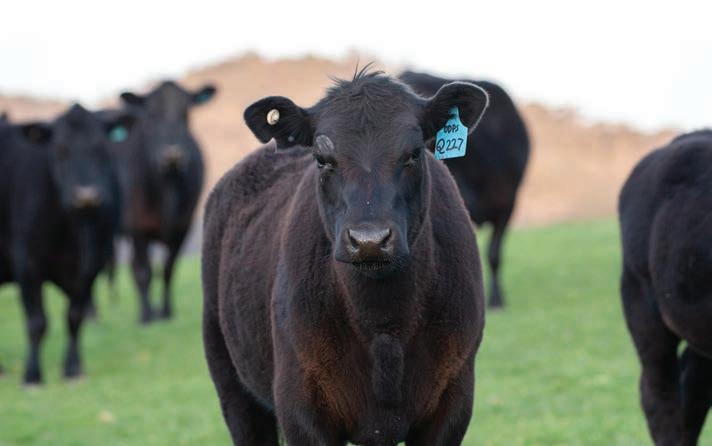
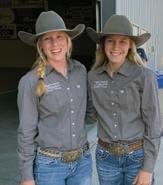
“If we want rural America to remain strong and vibrant, it’s critical that the cattle producers that feed us have access to fair markets and are receiving fair prices,” Tester said. “For years,

Tester Update Continued on Page

The old red milk barn is gone now, but for the three Baruth brothers, Larry, Tom and Ron, many memories remain.
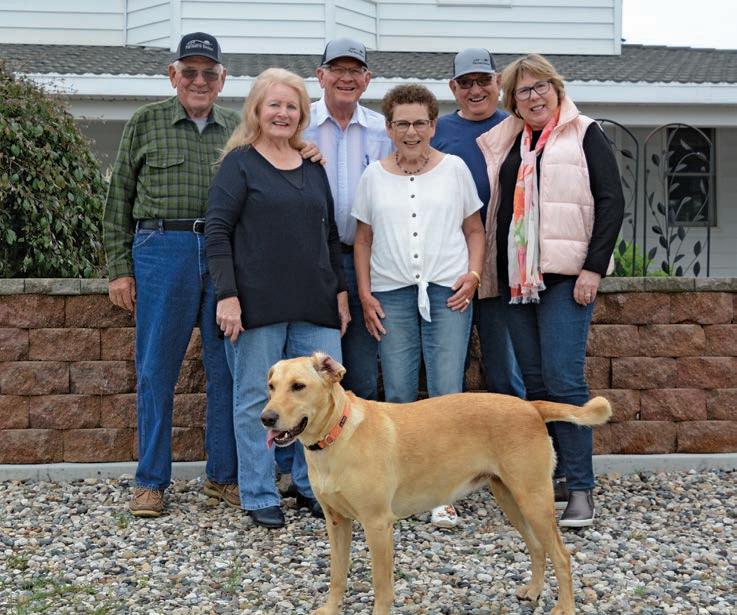
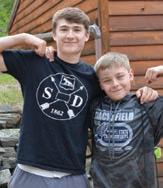
“We started milking cows by hand when we were 5,” explained Tom, the middle brother. “We were all excited when we got the milking machines because it meant we had time to play baseball.”
“Once in a while, if we played too much ball, the cows would kick the machines over. So, we’d clean things up, hook up two more cows and go out and play some more ball,” added the youngest brother, Ron.
It was a small herd – only 10 or so milk cows – but enough to keep three boys’ pockets lined with spending money (their parents let the boys keep the egg and cream checks). Even today, nearly six decades later, the men recall most of their milk cows’ names: Princess, Fawn, Pepsi, Frieda Goner, Star and Brindle.
“Brindle would kick with both legs – even with the kickers on,”
Nearly following his National Farmers Union keynote address, Montana Sen. Jon Tester provided cattle with the underway in D.C.
South Dakota Farmers Union has served South Dakota farm and ranch families for more than a century. Throughout the year, we share their stories in order to highlight the families who make up our state’s No. 1 industry and help feed the world. This month we highlight the Baruth family. Brothers Larry, Tom and Ron are pictured here with their wives (left to right) Jan, Sheila and Deb. Farm dog, Bella, posed for the photo too.
Baruth Family Continued on Page 2 Farmers Union Celebrates Beadle County Farm Family A PUBLICATION OF SOUTH DAKOTA FARMERS UNION 2022 State Leadership Camp PAGE 7 Farmers Union Sponsors State Rodeo Finals PAGE 8 Amendment C Fails PAGE 4 Volume CVII, No. 4 Huron, SD JULY 2022 SERVING SOUTH DAKOTA’S FARM & RANCH FAMILIES SINCE 1915. Meet Youth Leaders PAGE 6
4
three months
producers
an update on
work
for fair prices.
Participate in Grassroots Policy Attend 2022 Virtual Policy Meeting Date: July 14 Time: 9 a.m. (Central Time) Location: Virtual (Only Policy Committee & SDFU Board of Directors will meet in person) How to Participate? Visit www.sdfu.org and click on the Policy Meeting Event
Larry, the oldest, recalled. “We would take a rope and tie up one of her back legs so that we could milk her. It got to be too much and she turned into a nurse cow. She was a good nurse cow.”
There’s quite a few chuckles as the brothers recall growing up on their family’s farm near Alpena.
Sitting in their machine shed with their wives, the men talk about life on the farm and how it shaped who they are today. Their family farm is where they learned the value of hard work, but also the importance of taking a break to have some fun.
“We all played sports,” Ron said “But we had to get the milking done before we could play basketball or baseball. Mom and Dad came to every game, so we would ride with them.”
They credit their dad, Ernest, with their work ethic and their mother, Myrtle, with ensuring they had an opportunity to experience life off the farm. “She was really the one who got us to where we could do some things like play sports,” Ron said. “Dad had been raised just to work.”
Born in 1911, Ernest’s parents moved to the Alpena area from Nebraska when he was 11. Times and circumstances were not kind to the family, and as a young teen, Ernest ended up living and working for a successful farmer, Edgar Knox, who eventually became his stepfather.
“They would put the hogs on a train in Alpena, and send Edgar to ride along with them to Chicago,” said Larry, recalling a story their dad told them.
Over time, Ernest and his brother, Harlowe, started farming together. But in 1941 when the U.S. went to war, they had a tough decision.
“The U.S. government said, ‘one of you has to go into the service and the other one of you can stay and farm,’” Larry said. “Harlowe was married at the time and Dad wasn’t, so he told Harlowe he would go and
Harlowe could stay and farm.”
Ernest joined the Navy and served as a welder on a small destroyer, the Rathborn. It wasn’t too long after he joined the Navy that he married their mom, Myrtle Bergeleen.
To be near Ernest, Myrtle moved to San Diego, Calif., and went to work for an aircraft manufacturer.
“The day Larry was born, Dad was shipped off to the South Pacific,” Tom said.
Ernest would meet his firstborn, around the time that Larry turned 1.
“His ship was hit by a kamikaze plane. Dad helped patch the hole to keep it from sinking,” said Larry, who recently learned of his dad’s bravery through research. “Dad’s name is noted in the ship’s archives.”

Ron points out that because the conversation about their family’s farm is taking place on June 6, 2022, it is appropriate to be discussing their dad’s World War II service. “This is D-Day. Thousands of young men died on this day,” he said.
Larry opens an envelope and pulls out an old black and white photo of their dad and Uncle Harlowe working on a tractor. More than likely, their Grandpa Knox took the photo in this same farmyard.
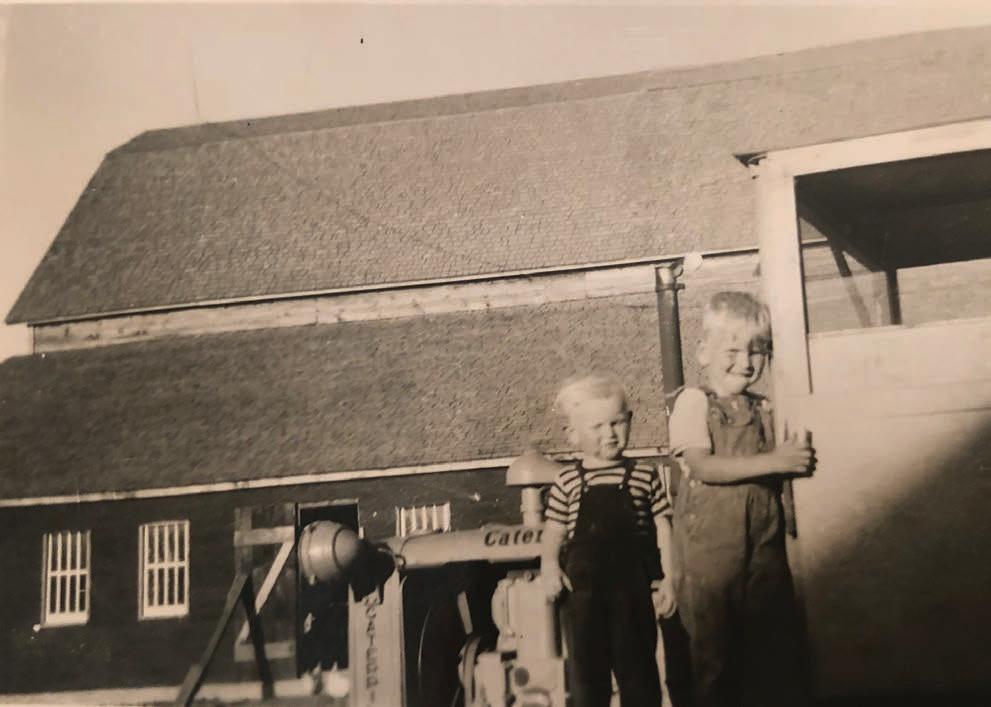
When he returned home after the war, Ernest purchased the farmstead and land from his brother, Harlowe, with the help of his stepdad, Edgar Knox. “Grandpa Knox told Dad that he would help him buy the farm as long as Dad would let him come out and work whenever he wanted,” Ron said.
In addition to the small dairy herd,
Ernest’s farm had a cow/calf beef herd and feedlot along with hogs. The family also raised corn, oats, alfalfa and prairie hay.
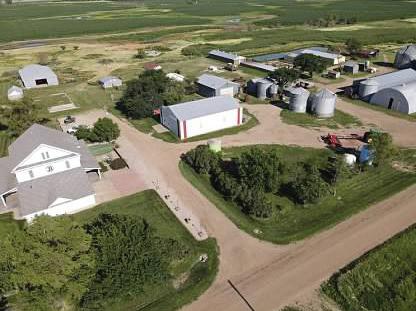
The Baruth Brothers’ Farm
After high school, all three Baruth brothers went on to college. Ensuring that their sons received a college education was important to their parents.
“That was their gift to us for working on the farm,” Tom explained.
Larry attended South Dakota School of Mines and Technology (SDM&T) and received a mechanical engineering degree. Tom received his master’s in chemistry from South Dakota State University. Ron also attended SDM&T and received a mining engineering degree.
The men again credit Myrtle for their focus on education. Their mom completed high school in three years and received a 21st St., SD 605.352.5792
Photo of young Larry and Tom Baruth standing in front of the old red barn where they used to milk cows.
DD Double D Western Wear & Tack 800
Huron,
www.ddwesternhuron.com For the Cowboy In All of Us Farmers Union Members get 20% OFF* one item only! Present this coupon with your purchase *Excludes all boots, shoes, men’s jeans and tack Baruth Family Continued from Page 1 Union Farmer 2 July 2022 www.sdfu.org
Union Farmer
teaching degree before she married their dad. Throughout their childhood, she worked to achieve a master’s in education.
After college, all three men started careers in their field of study. Larry worked for a steel company in Ohio. Tom worked for the Wisconsin State Crime Lab and Ron worked for a coal company in Illinois.
But they were not content.
“I knew I was disposable,” Larry said. “Times were tough in the steel industry. I saw guys laid off who had been working in their jobs 20 years.”
So, when Ernest fell off a ladder in 1972 and asked Larry to take vacation time to help cultivate corn, it didn’t take too much to convince him to return to the farm full time.
“He told me he thought he would have to sell the farm because he was too injured to work and it was just him on the farm at that time. That was a wake up call,” Larry said.
Ron felt the same way. He also gave his notice and returned to the farm.
A few years later, Tom came back to the farm as well. He brought his wife, Sheila, and their firstborn, Shayna.
“The farm next door came up for sale, and I knew that if ever I was going to come back to the farm, this was the time,” Tom said. “And Larry and Ronnie said, ‘you know, if ever you want to come back, we invite you to come back.’”
It was 1976, and with four adults drawing a salary from one farm, it wasn’t easy. “Mom always made sure we could make ends meet,” Tom said. “And Larry and Ronnie were very kind. They were not married at the time and they were living
with Mom and Dad so they didn’t have many expenses. Sheila and I had a child, so we had a lot of expenses. They said the farm needed someone to keep the books, so they designated that job to Sheila.”
“And we did not have any debt,” Ron added. “If we could not afford it, we did not buy it.”
They add that along the way, they also had a bit of luck.
“We never had to get in a bidding war for land,” Larry explained. “And when it came up for sale, it was a reasonable price.”
“Many times, people came to us and asked us to buy their farm ground,” Ron added.
“We are honest and people knew we would treat them right and treat their land right,” Tom said.
With his sons managing the crops, cattle and hogs, Ernest spent more time doing what he loved most – fixing machinery.

“With Dad and two engineers, we could always buy something that needed fixing and fix it,” Tom said.
Ernest lived in the big white farm house where he and Myrtle raised their sons until he passed away at 97.
“Nearly every day he said, ‘I am really lucky. I have my boys and I have everyone here I love but one.’ He was talking about Myrtle. She died when she was only 65,’” Sheila shared.
Today, Larry and his wife, Jan, live in the original farmhouse. Tom and Sheila live just three-fourths of a mile west and Ron and Deb live two miles southwest.
All three men say they appreciate the fact that early on, their dad let them make management decisions and do things different from how he had done them.
No-till field management is one example Ron shared. The men began no-till field management in 1990. “One year the corn was very dry. We still had time to plant wheat after we got the corn off. There was some moisture in the soil, but we knew as soon as we tilled it would be dry. So, we got to looking around and John Deere made a no-till drill. We no-till planted the wheat and got a good stand. We decided right then and there this was the way to do it.”
Ron and his brothers began following the work and research of Dwayne Beck, the Research Manager at Dakota Lakes Research Farm.
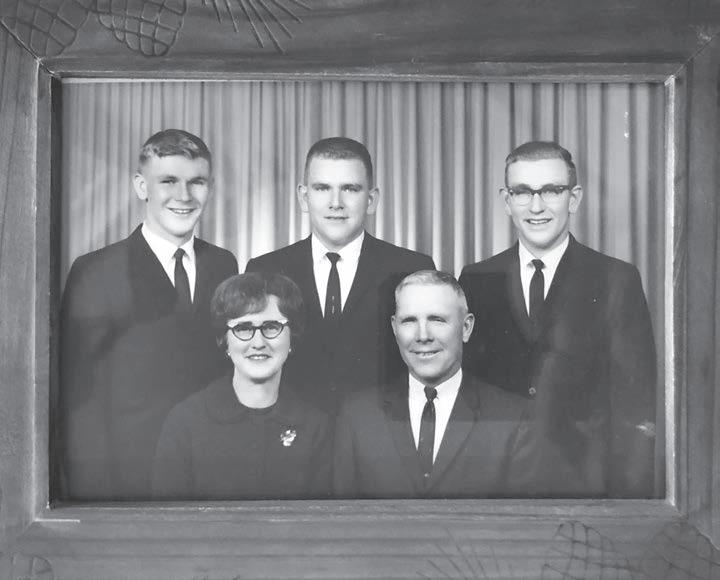
“He got us into double cropping,” Ron said. “We would plant winter wheat, take the winter wheat off and go in and no-till drill Sudan grass and chop it for cattle feed.”
How does a farmer retire?
After Ernest’s death in 2009, the brothers began discussing the future of their family farm. They met with a financial adviser who said they needed to divide up ownership of
Larry, Tom and Ron’s dad, Ernest is pictured here, far left, working on a tractor with his brother, Harlowe.
Old family photo of the Baruth brothers and their parents, Ernest and Myrtle.
Baruth Family Continued on Page 11 www.sdfu.org July 2022 3
Amendment C Fails & Voice of the People Remains Strong
June 7, 2022, all South Dakota counties but one voted
“No” on Amendment C – a measure designed to do away with majority rule by increasing the voter threshold to 60 percent.
“The failure of Amendment C tells me that you as the voter make a difference,” said Doug Sombke, President of SDFU.
Policy opposing Amendment C was voted into South Dakota Farmers Union (SDFU) policy book by members during the 2021 State Convention.
“Our members opposed Amendment C because it would make passing initiated measures nearly impossible,” Sombke said. “Initiated measures are the people’s voice – initiated measures give the people, not elected officials, the opportunity to make laws. Initiated measures are as grassroots as it gets.”
And initiated measures have been part of the governmental makeup of South Dakota since the early years of statehood. Voted into law by the state legislature in 1897, South Dakota became the first state in the nation to allow initiated measures.
“By voting ‘No’ on Amendment C, South Dakotans protected democracy and a clear message, ‘if it’s not broke, don’t fix it,’” said Zach Nistler, campaign spokesperson for the Vote No on Amendment C campaign.
SDFU was among a large coalition of organizations throughout South Dakota that advocated against the measure.
“It always feels good advocating for policy on behalf of our members. When you get to work with a coalition, it strengthens message and allows the message to reach a larger audience,” Sombke said. “The results of this vote sent a message that South Dakota is one big melting pot of people who love our freedoms and communities.” ■
Read What Our State’s Constitution Says AboutInitiatives Measures
§ 1. Legislative power--Initiative and referendum.The legislative power of the state shall be vested in aLegislature which shall consist of a senate and house ofrepresentatives. However, the people expressly reserveto themselves the right to propose measures, whichshall be submitted to a vote of the electors of the state,and also the right to require that any laws which theLegislature may have enacted shall be submitted to avote of the electors of the state before going into effect,except such laws as may be necessary for the immediatepreservation of the public peace, health or safety, supportof the state government and its existing public institutions.Not more than 5 percent of the qualified electors of thestate shall be required to invoke either the initiative or thereferendum.
This section shall not be construed so as to deprive theLegislature or any member thereof of the right to proposeany measure. The veto power of the Executive shall notbe exercised as to measures referred to a vote of thepeople. This section shall apply to municipalities. Theenacting clause of all laws approved by vote of the electorsof the state shall be: “Be it enacted by the people of SouthDakota.” The Legislature shall make suitable provisions forcarrying into effect the provisions of this section
Montana ranchers have told me that it’s becoming harder and harder to make their operations pencil. Generational ranchers are being forced to sell their land or operate at a loss, and a lack of competition in the meatpacking industry is a main reason why. Fair prices are the best sign of a competitive market, and as big packers continue to reel in record profits, producers and consumers alike aren’t getting their fair shake.”
Market transparency and fair prices for cattle producers were a focus of the keynote address given by Tester during the 2022 National Farmers Union Convention held in Denver this March.
“Family farm agriculture has been pinched on both sides for so long,” Tester said in his March 2022 address to members. “We need to reintroduce capitalism into the marketplace so family farm production ag can be vibrant once more.”
To accomplish this, Tester outlined five
bills during his address that he was working on collaboratively:
• Cattle Price Discovery and Transparency Act (S. 4030)
• Meat Packing Special Investigator Act (S. 3870)
• American Beef Labeling Act (S. 2716)

• New Markets for State Inspected Meat Act (S. 107)
• Brazilian Beef Legislation (S. 3230)
After hearing the senator’s convention comments, Reliance rancher David Reis felt guarded optimism. “We have been working
for this for so long,” said Reis, “I hope these efforts are not lost with all the other stuff going on right now.”
Tester provides an update
On June 13, Tester said thanks to bipartisan support, momentum is still going strong in cattle producers’ favor.
His comments focused specifically on two pieces of legislation which he is optimistic will receive the necessary Ag Committee votes to reach the Senate floor – the Cattle Price Discovery and Transparency Act (S. 4030) and Meat Packing Special Investigator Act (S. 3870).
Tester’s optimism is based on the bipartisan support each act received as well as the positive response he received following an April 26 Senate Agriculture Committee hearing where he testified on their behalf, saying, “Ag production has
“Fair prices are the best sign of a competitive market, and as big packers continue to reel in record profits, producers and consumers alike aren’t getting their fair shake.”
– Montana Sen. Jon Tester
Union Farmer
Tester Update Continued from Page 1
Tester Update Continued on Page 5 4 July 2022 www.sdfu.org
gotten far more consolidated than when I took over the farm 44 years ago in 1978,” Tester said. “And it’s not one party’s responsibility, the fact is that both parties have watched this happen and we’ve done nothing. Today, we have an opportunity to do something. Why? Because we’ve seen a mass exodus off the land. Rural America is drying up. On the other side of the equation we see consumers are being treated unfairly in the marketplace because there’s no competition. Today we can address both of those issues with these bills.”
If signed into law, each bill would address a challenge impacting cattle producers’ opportunity to receive fair prices for the cattle they raise.
“Nearly 85 percent of the meatpacking industry is controlled by four corporate meatpackers. Right now, the executives of these companies have the power to go out onto the golf course and decide what they’re going to charge our ranchers for their premium beef. These two bills will help change that,” Tester said. “We don’t
want to take down the big packers, but we do want to increase transparency and competition in the market by enforcing existing antitrust laws, so we can get to the core of the problem. Once passed, we’ll finally be moving in the right direction to ensure that our cattle producers are able to remain viable and folks won’t have to sell the farm to stay afloat.”
Tester’s Meat Packing Special Investigator Act, co-led by Republican Sens. Grassley (R-Iowa) and Rounds (R-S.D.), would create the “Office of the Special Investigator for Competition Matters”

within the U.S. Department of Agriculture (USDA).
This office will have a team of investigators, with subpoena power, dedicated to preventing and addressing anticompetitive practices in the meat and poultry industries and enforcing our nation’s antitrust laws.
Tester’s Cattle Price Discovery and Transparency Act, co-led by Sens. Fischer (R-Neb.), Grassley (R-Iowa) and Wyden (DOre.), sets regional mandatory minimum thresholds for negotiated purchases of fed cattle by large meatpackers.
It also includes a number of transparency measures, including the creation of a cattle contract library, requirements that packers report carcass weight more quickly and that they report the number of cattle scheduled for slaughter each day for the next 14 days.
What can cattle producers do to help?
The fight for transparency, fair prices and enforced oversight of the Big Four packers
“We don’t want to take down the big packers, but we do want to increase transparency and competition in the market by enforcing existing antitrust laws, so we can get to the core of the problem.”
– Montana Sen. Jon Tester
Tester
Sen. Tester speaks to members during the 2022 National Farmers Union Convention.
Union Farmer
Tester Update Continued from Page 4
www.sdfu.org July 2022 5
Update Continued on Page 6
Union Farmer
Rural Youth Leaders Eager to Serve & Strengthen Farmers Union Camp Experience
Tester
Melanie Raap-Eitreim, Aeriel Eitreim’s mom attended Farmers Union camp as a kid. She’s the reason Aeriel signed up to attend Farmers Union camp with her cousins 10 years ago.
Ashley Hanson has a similar story. Her dad, Lorrie, attended Farmers Union camp when he was a kid.
“My dad liked Farmers Union camp and he is the reason we all got to go to Farmers Union camp from the time we were little kids,” explained Hanson, who is from Britton.
But it’s not their parents that kept the high school seniors engaged and signing up to attend Farmers Union camp every summer since they were 8.
“It’s everything about camp. I like everything about it,” said Eitreim, who is from Sioux Falls.
Eitreim and Hanson will return to camp summer 2023, this time not as campers, but as camp organizers and counselors. The teens were selected through an application and interview process to serve on the Junior Advisory Council along with three other teens: Chaz Blotsky, Mission; Jayda Walton, Mitchell; and Garrett Kruger, De Smet.
Together, the Junior Advisory Council members will help plan and organize the 2023 Farmers Union State Leadership Camp. They will also serve as camp counselors throughout the week-long leadership camp.
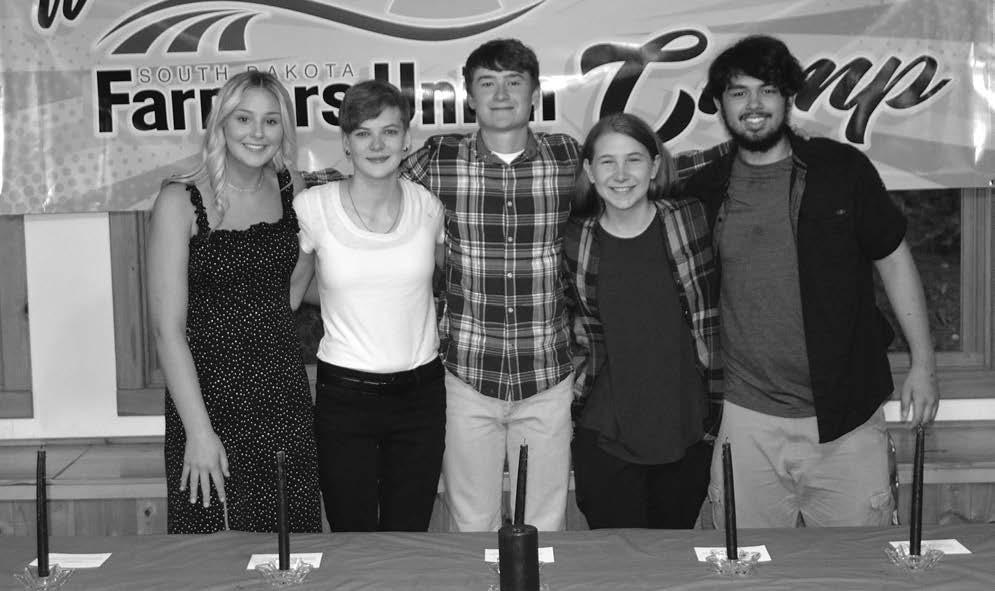
“Planning camp will take a lot of communication because we live in different areas of the state,” Kruger said. “But I am definitely excited to plan camp with my
friends.”
Developing communication skills are among the many ways Kruger says he has benefited from attending Farmers Union camps. “I have gained communication and cooperation skills for sure. If we don’t communicate during our cooperative activity, we don’t succeed.”
As a way to educate youth on the cooperative business model, during camp youth operate cooperatives together. This year, Kruger was part of the Housing Cooperative. “Campers needed to go through us if they wanted to switch rooms to be with their friends,” Kruger explained.
Time with friends is among the reasons Blotsky makes time for camp each summer. “I call my Farmers Union friends, ‘lifelong friends,’” Blotsky said. “We get to know each other so well during the week of camp. Everyone listens to each other. No one is left out.”
Blotsky said in his role serving on the Junior Advisory Council, he is eager to bring back and strengthen camp traditions and he will work to encourage new campers to attend.
Expanding camper numbers also tops Walton’s list of goals. “I have some ideas on how to make it grow – like promoting it in schools,” she said. “I also look forward to serving as a leader at camp and working to make it a fun experience for every camper.”
To learn more about Farmers Union youth programming, visit www.sdfu.org. ■
By Lura Roti
– Doug Sombke, SDFU President
has gone on for decades. And it has remained a truly grassroots, bipartisan effort, explained Doug Sombke, South Dakota Farmers Union President and fourth generation crop and cattle producer.
“We were fighting for fair prices when I was a young farmer starting out in the late 1970s. And Farmers Union continues to advocate for policy to support fair prices for cattle producers today,” Sombke said.
With the COVID-19 pandemic supply chain disruptions shining a light on market manipulation, Sombke and Tester encourage cattle producers and their supporters to continue their grassroots advocacy.
“Let our congressional leaders know that you appreciate their support of these bills,” Sombke said. ■ By Lura Roti
Share your support & your story
Reach out to South Dakota’s Congressional leaders. Let them know you support Meat Packing Special Investigator Act and Cattle Price Discovery and Transparency Act. Please share your story about why these acts are important to your family’s farm or ranch. And if you are not a farmer or rancher, take the time to share why as a consumer it matters that U.S. cattle producers receive a fair price for the cattle they raise.
Congressional Leader Contact: Rep. Dusty Johnson, 202-225-2801 / 855-225-2801, reid.rasmussen@mail. house.gov; Sen. Mike Rounds, 202224-5842 / 844-875-5268, logan_ penfield@rounds.senate.gov; and Sen. John Thune 202-224-2321 / 866850-3855, ryan_donnelly@thune. senate.gov.
“We were fighting for fair prices when I was a young farmer starting out in the late 1970s. And Farmers Union continues to advocate for policy to support fair prices for cattle producers today.”
2022 Junior Advisory Council, (left to right) Jayda Walton, Ashley Hanson, Chaze Blotsky, Ariel Eitreim and Garrett Kruger.
Update Continued from Page 5
6 July 2022 www.sdfu.org
Senior Camp Students Grow in Leadership Through Challenges, Activities


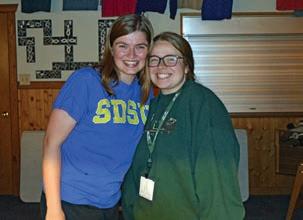
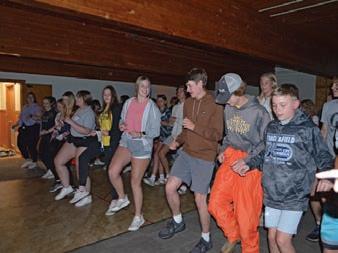
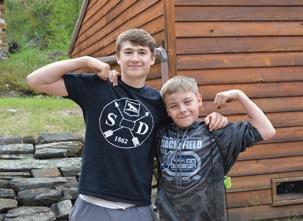


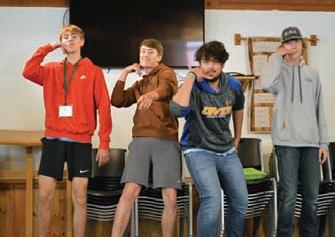

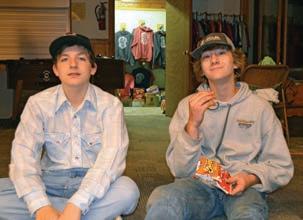
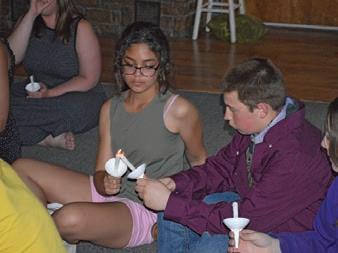
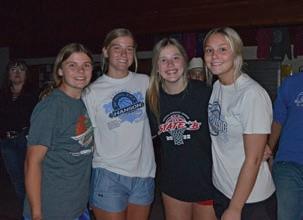
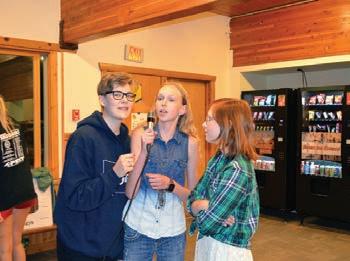
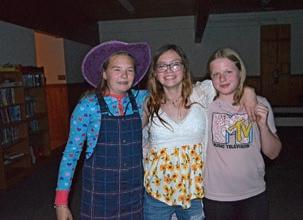

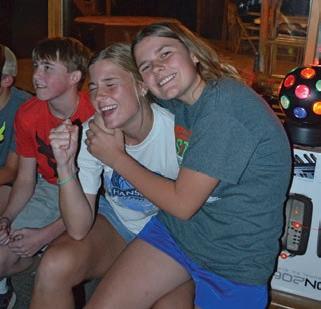
Leadership isn’t necessarily taught. It is something learned over time through challenges, inspiration and discussion. That was part of the message from this year’s South Dakota Farmers Union Senior Camp held at Storm Mountain Center.
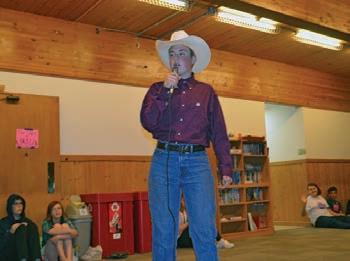
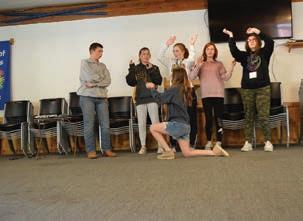
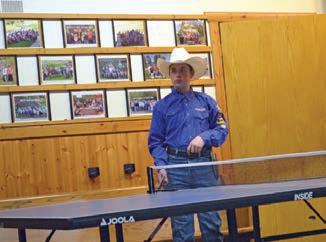

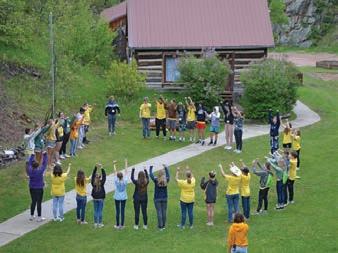
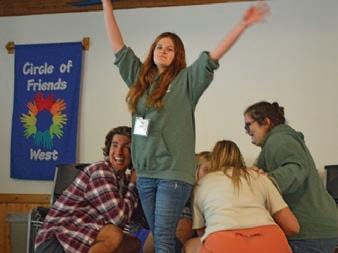
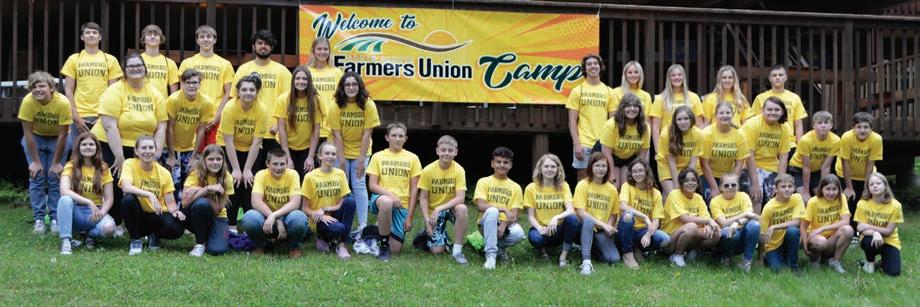
On June 6-10, students participated in a variety of activities from ropes challenge courses to cooperative-themed games and even an interviewing skills session.
Chandra Calvert, Director of Industry Relations and Grant Management from Western Dakota Technical College, worked with the campers on practice interview
exercises.
“We focused on ways students can tell their own stories and how their personal experiences and passions can make for a great interview,” said Calvert.
Calvert guided campers through mock interviews to help them gain confidence in their ability to talk about themselves and have pride in their experiences and accomplishments.
“We are often too ‘South Dakota humble’ and are afraid to brag about ourselves,” said Calvert. “However, there is a way to be proud without being arrogant. I
hope that lesson came across in our practice interviews. The goal is for students to gain confidence as they go through life.”
Elizabeth Schoenfelder, a seventh grade student from Dimock, enjoyed Calvert’s presentation. “I really liked how she explained everything. She made the steps of interviewing easy to understand and follow.”
Another featured guest at camp was Dan Meers, widely known as the KC Wolf, the official mascot for the Kansas City Chiefs.
www.sdfu.org July 2022 7 Union Farmer
Leadership Camp Continued on Page 10

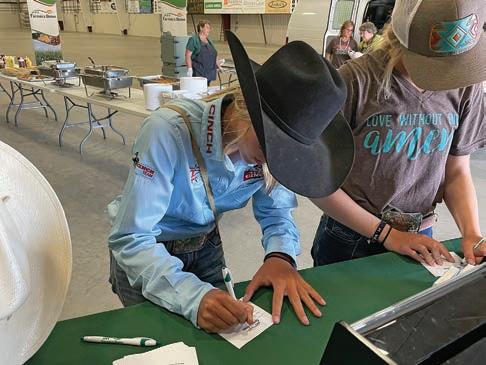
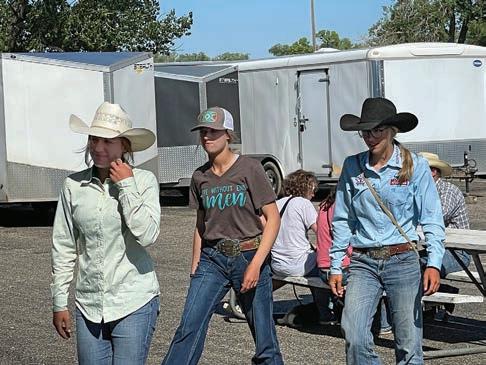
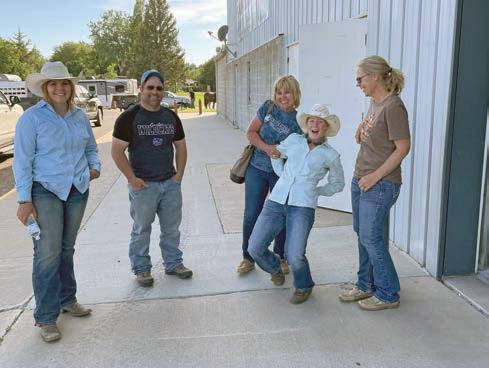
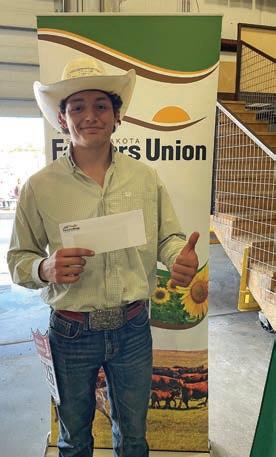
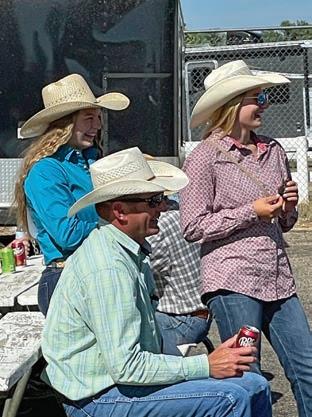


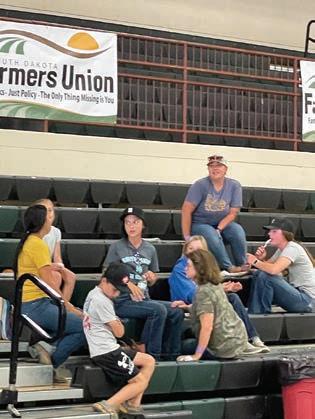

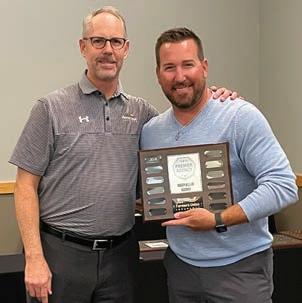
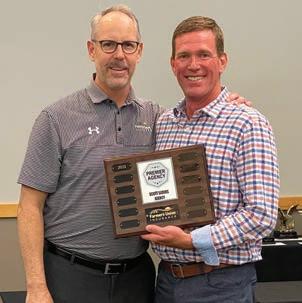
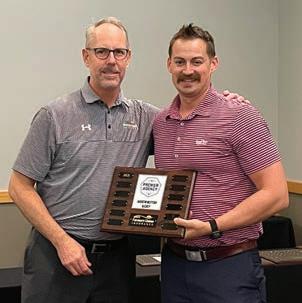
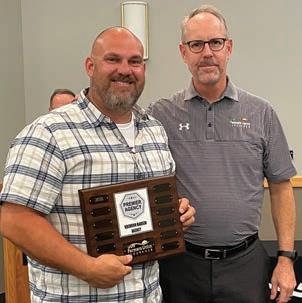

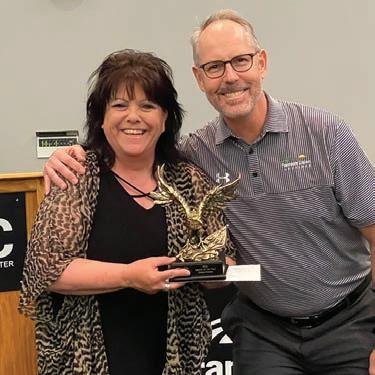 Premier Agent Andrew Mefferd Agent Dawn Melius Murphy Scott Sabers Brendon Hanson
Premier Agent Andrew Mefferd Agent Dawn Melius Murphy Scott Sabers Brendon Hanson
Union Farmer South Dakota Farmers Union members and staff are making a difference in rural communities across South Dakota. Around the State with Farmers UnionRODEO FINALS 2022 STATE INSURANCE EVENT Premier Agent Kasey Keller
Premier
Premier Agent James
Premier Agent
Premier Agent
Agency of the Year Donna Enders 8 July 2022 www.sdfu.org
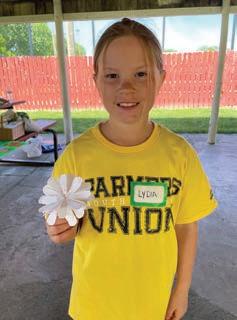
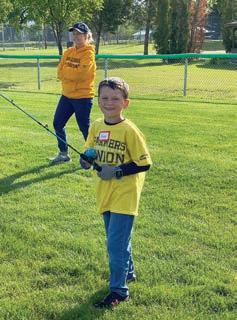
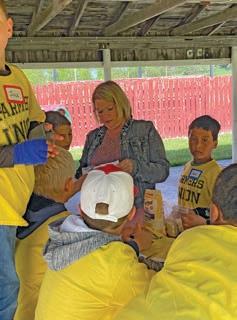

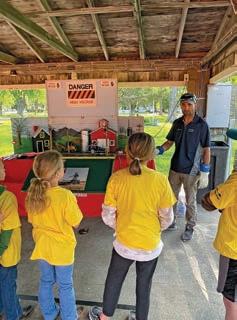
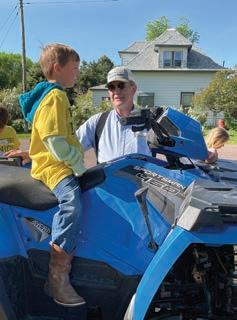

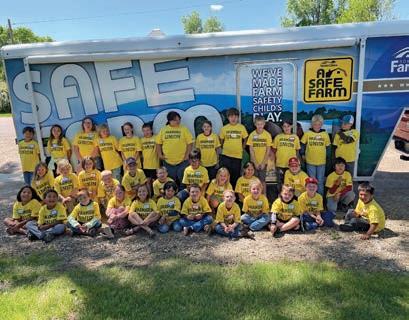
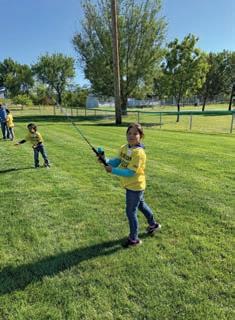

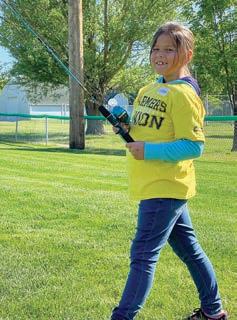

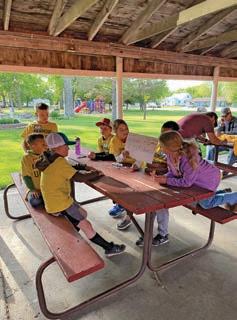

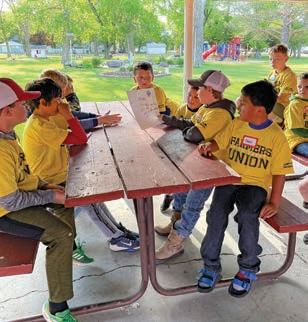


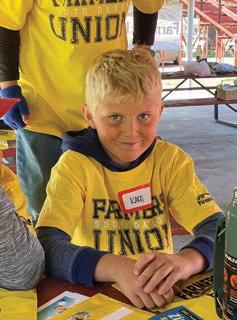
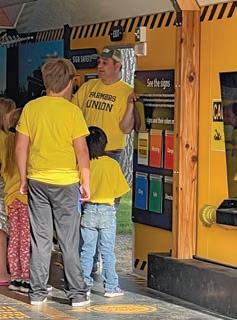
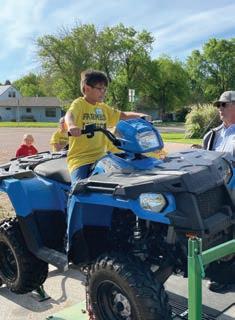
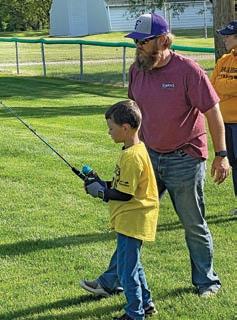
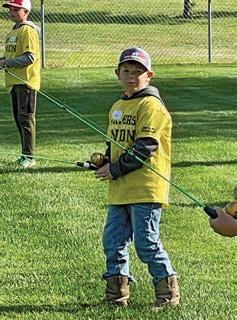
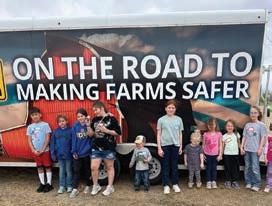
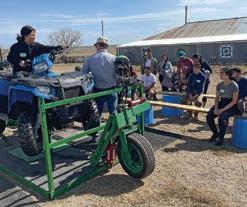
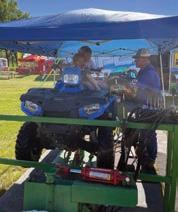
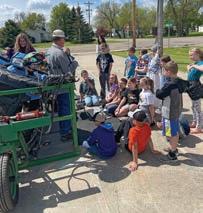
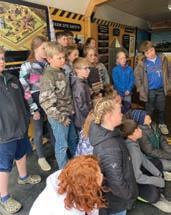

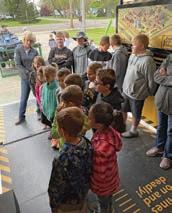
www.sdfu.org July 2022 9 Union Farmer COUNTY CAMPS SAFETYTRAILER FT. PIERRE DAYS ESTELLINE RODEO DAYS FAULKTON SAFETY DAYS LEMMON SAFETY DAY
South Dakota Farmers Union Launches 2022 Photo Contest: Celebrating Life on the Family Farm &Ranch Photo Contest
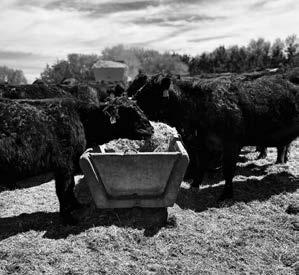


South Dakota Farmers Union (SDFU) hosts its annual photo contest, Celebrating Life on the Family Farm & Ranch April 1 through Dec. 1, 2022.
“Agriculture is our state’s No. 1 industry. This photo contest celebrates the families who do the work,” explained Karla Hofhenke, SDFU Executive Director.
Photographers can submit photos in one of five categories: Livestock, Fieldwork, Farm/Ranch
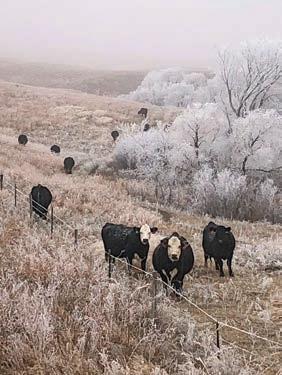
Scenes, Working on the Farm/Ranch or Photos taken by 4-H Members.

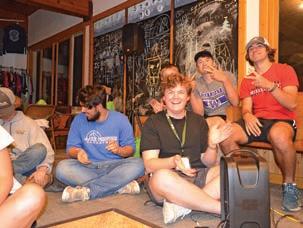
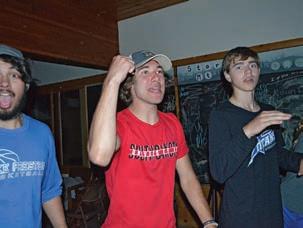
Qualifying entries will be judged, with the winning photographer from each category receiving $100.
All photos need to be entered via SDFU website: www.sdfu.org. To enter and for contest rules, visit www.sdfu.org and click on the Photo Contest link under the News & Events tab. ■
Meers is not only the Kansas City mascot, but also a humorous and motivational speaker. He spoke to the campers on leading a life of influence.
“All of us are gifted in different ways,” said Meers. “You don’t have to have a million followers on Twitter or Instagram to walk into a room and make a positive impact. We can all use our skills to be influential every day.”
Throughout camp, students and Junior Advisory Council members used their skills too, participating in a mix of activities, entertainment and education.
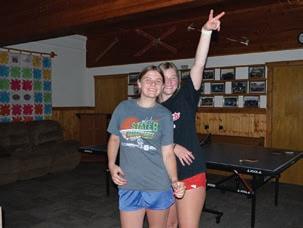
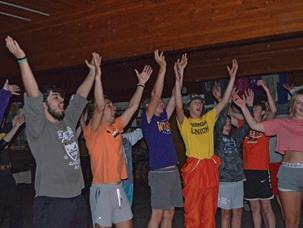
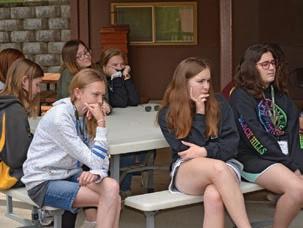
“Our cooperative discussions were very eye opening,” said Chaz Blotsky, a recent graduate of Winner High School. “I enjoyed learning how cooperatives support the community and the people in the community.”
South Dakota Farmers Union Education Director Rachel Haigh-Blume added, “Leadership is not about being in a position of power. Leadership is about acquiring skills such as communication, empathy,
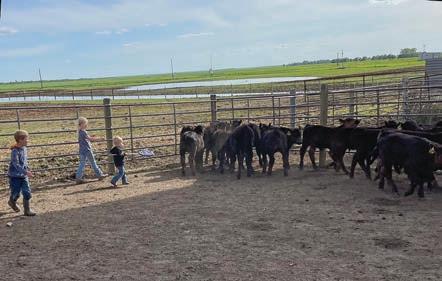
patience and understanding. The campers used these skills in unique, hands-on ways while at camp, and I am so thankful to be a part of their journey.”
 ■ By Toby Kane
Malorie Anderson
Lauren Gapp
Samantha Swanson
Kaylee White
Mary Scott
Charles Belcher
Leadership Camp from
■ By Toby Kane
Malorie Anderson
Lauren Gapp
Samantha Swanson
Kaylee White
Mary Scott
Charles Belcher
Leadership Camp from
Union Farmer
10 July 2022 www.sdfu.org
Continued
Page 7
their farm acres.
“He told us we faced a disaster if one of us died. It was great advice,” said Larry, who has faced some health challenges over the last few years. He became extremely ill after he contracted West Nile from a mosquito bite. And in 2019, he had triple bypass surgery.
In 2010, Larry and Jan decided to start wintering in Arizona, not long after, the brothers decided the timing was right to sell out of the cattle business. “Our cattle operation was too big for two people to run,” Larry said.
Jan can be credited for getting the brothers to purchase long-term care insurance. “She said, if you go into the home and you do not have insurance, what have you been working so hard for all these years,” Ron said.
In 2015, Ron’s first wife suffered a devastating accident and needed around the clock care. “With longterm care insurance and social security, we were able to make the monthly $6,600 payments,” Ron said.
Nearly a decade after getting out of the cattle business, a friend who helped plant and harvest was no longer able to help, and the men decided it was time to retire.
“We didn’t want to have to hire a bunch of employees and we thought we better retire while we are all still living,” Larry said.

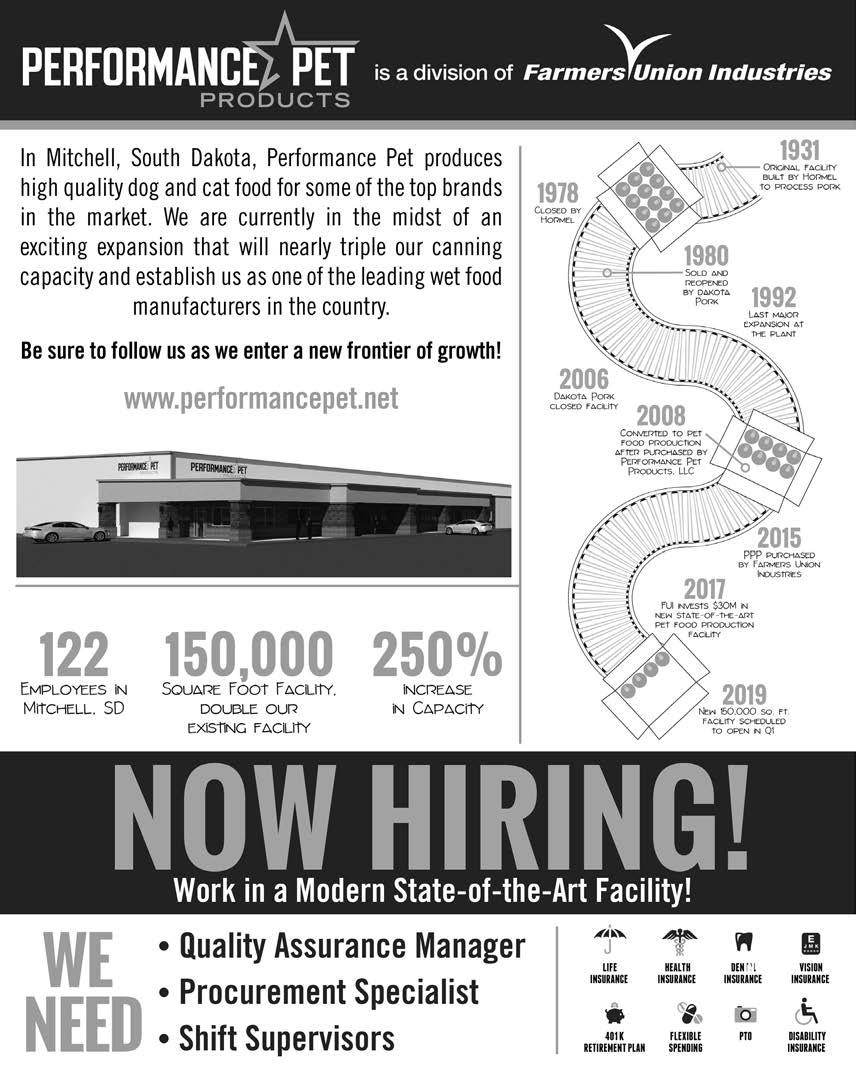
“We were sitting right here, in this machine shed talking about our options and Ron said, ‘I think we are done,’” Tom said. “We always knew that if one of us was ready to quit, we would all quit.”
Beginning spring 2020, the men all decided to lease their land to area farmers. “I thought it would be tough not to plant in the spring, but I actually enjoy watching the young farmers plant,” Tom said. “All our renters are good farmers.”
Ron agrees. “It got to the point where I could not physically do the work like I used to. I have had surgery on both rotator cuffs – it was good timing.”
Retirement from a lifetime of farming does not happen over night. Throughout their entire farming career, the men shared equipment and machinery. They just wrapped up their fourth online auction.
“We met at our house and sat with some beers and watched the bidding on our big screen,” Ron said.
Because they all own farmland separately, they each have different plans for what will happen when they are gone.
Ron’s plan is that his land will one day become The James River Valley Research Farm. “I did not want my land to get gobbled up by a huge farmer. I wanted to give back to research because it is part of what made us successful.”
■ By Lura Roti for SDFU
www.sdfu.org July 2022 11 Baruth Family Continued from Page 3 Union Farmer
Union Farmer

During the past few months, NFU has been aggressively pursuing our Fairness for Farmers priorities, as several new legislative and executive actions have been introduced, advanced and implemented. Major areas include progress in the House and Senate on legislation covering competition laws, market oversight and transparency, and antitrust enforcement. We’ve also seen major commitments by the administration to strengthen our food system and protect farmers from anti-competitive practices.
CONGRESS ACTING SWIFTLY ON ANTITRUST ENFORCEMENT AND CONSUMER PROTECTION, CATTLE MARKET REFORM
On June 16, the U.S. House of Representatives passed H.R. 7606, the Lower Food and Fuel Costs Act. The legislation seeks to address rising food, fuel and fertilizer costs, strengthen food supply chains and increase competition in the livestock industry.
The bill includes a major NFU priority, the Meat and Poultry Special Investigator Act, which will create an “Office of the Special Investigator for Competition Matters” at USDA to enforce antitrust laws and hold bad actors in the livestock industry accountable. The bill was originally introduced by Reps. Abigail Spanberger (D-VA) and Mariannette Miller-Meeks (R-IA).
The bill also includes the Butcher Block Act (cosponsored by Reps. Spanberger and Dusty Johnson (R-SD) which will help increase competition in the livestock industry by incentivizing expanded processing capacity through loans, loan guarantees and grants.
Also in the package are key provisions on biofuels, food supply chain resiliency and precision agriculture:
• Allow year-round sales of E-15, a step in the right direction in usage of higher-level blends of ethanol. It achieves this by making permanent a waiver the administration announced in April to allow summer sales E-15, amending the law to allow higherlevel blends to be sold between June 1 and Sept. 15 each calendar year.
• Authorize $200 million in funding for fiscal years 2022 and 2023 for competitive USDA grants to fuel retailers and distributors to offset costs of installing blender pumps that can dispense fuel mixtures with more than 10 percent ethanol or 20 percent biodiesel.
• Direct USDA to establish the “Agriculture and Food System Supply Chain Resilience and Crisis Response Task Force;” the
Rob Larew National Farmers Union President
taskforce leader would be appointed by the secretary, who would serve as a special advisor to the department on supply chain resiliency issues.
• Authorize additional funds for USDA to incentivize producers with new or existing contracts under the Environmental Quality Incentives Program (EQIP) to implement nutrient management practice or adopt precision agriculture practice that can help reduce fertilizer use.
• M ake several changes to USDA conservation programs to make it easier for farmers to acquire precision agriculture equipment and adopt precision agriculture practices.
In the Senate, the Cattle Price Discovery and Transparency Act is likely to be marked up by the Senate Agriculture Committee in the coming weeks and could soon be considered on the floor.
NFU remains vocal and enthusiastic in support of these bills and we hope to see them advance in short order.
USDA ANNOUNCES FRAMEWORK TO REFORM NATION’S FOOD SYSTEM
During an address to stakeholders at Georgetown University in Washington, D.C., USDA Secretary Tom Vilsack announced the details of a framework “to transform the food system to benefit consumers, producers and rural communities by providing more options, increasing access and creating new, more and better markets for small and mid-size producers.” The announcement included the announcement of some new investments, and reminders of some key investments already made by USDA.
The broad goals of USDA’s Food System Transformation framework were described as:

• Building a more resilient food supply chain that provides more and better market options for consumers and producers while reducing carbon pollution.

• Creating a fairer food system that combats market dominance and helps producers and consumers gain more power in the marketplace by creating more and better local market options.
• Making nutritious food more accessible and affordable for consumers.
• Emphasizing equity.
Announced investments totaling $2.1 billion spanned the areas of food production, food processing, food distribution and aggregation and markets and consumers.
More specifically, investments were announced for the Food Supply Chain Loan Guarantee Program, food supply chain infrastructure, independent meat and poultry processing (including for physical infrastructure, technical assistance and workforce development and training), for the creation of regional food business centers, for commodity purchases through farmto-school programs, reducing food loss and waste, to fund the Health Food Financing Initiative (HFFI), the Senior Farmers Market Nutrition Program, the GusNIP Produce Prescription Program, for SNAP technology improvements, to create a new Health Food Incentive Fund, to fund the Organic Transition Initiative and additional funding to support urban agriculture.
NFU CONCERNED WITH SOLICITOR GENERAL’S CROP PROTECTION BRIEF
In late May, NFU sent a letter to President Biden expressing concern with an amicus brief submitted by the U.S. Solicitor General to the Supreme Court on the labeling of glyphosate, which could have implications for other crop protection products as well.
NFU is concerned the approach taken in the Solicitor General’s brief could create an unworkable patchwork of state labeling requirements and is inconsistent with a sciencebased regulatory approach. NFU asked for the brief to be withdrawn and for USDA to be consulted on the implications of the position taken in the brief. Secretary Vilsack has said he had not been consulted by the Department of Justice.
The Solicitor General’s brief argues the Federal Insecticide, Fungicide and Rodenticide Act (FIFRA) does not keep states from imposing additional labeling requirements, even if those requirements contradict federal findings.
This issue relates back to the Monsanto v. Hardeman case, just one of thousands of lawsuits individuals filed against Monsanto alleging the company violated California law by failing to warn that glyphosate can cause cancer. In the case, Monsanto argued the FIFRA preempted Hardeman’s claim.
The district court rejected this argument and the jury found Monsanto liable. Monsanto appealed, and the U.S. Court of Appeals for the Ninth Circuit affirmed the prior ruling. Monsanto then appealed to the Supreme Court, which invited the U.S. Solicitor General to offer her views. ■ Current as of June 15, 2022
12 July 2022 www.sdfu.org
From the President.... Making Strides Toward Fair Markets
Doug Sombke, SDFU President
I’m frequently asked, “Doug, how can we get kids to return to their families’ farms and ranches?”
Well, for starters, we need to make production agriculture profitable. We need to ensure they can earn a living. And this is tough, because in production agriculture we continue to pay retail for all our inputs and receive wholesale for our crops and livestock.
It is rare to find a young farmer or rancher these days who is able to support their family solely on the income they earn from their operation. On our family farm for example, my sons and their wives work second jobs to make ends meet.
Fair prices are the solution – not government subsidies. Farmers Union has been advocating for fair prices since our founding more than a century ago. And throughout the century there have been wins. As I write this column, there are three acts making their way through congressional committees that once passed into law will help with fair prices for farmers and ranchers.
Two acts are discussed in length in this issue of the Union Farmer: Cattle Price Discovery and Transparency Act (S. 4030) and Meat Packing Special Investigator Act (S. 3870).
Both of these acts have bipartisan support and should become law. We know these acts will not fix everything that is wrong with the cattle markets, but they are a good start. Once there is transparency and a dedicated group focused on oversight, it will be much more challenging for the Big Four to fix prices.
I appreciate the work Montana Sen. Tester has done and I am so proud of South Dakota Farmers Union and National Farmers Union for putting policy in place to advocate for and support these bills. It surprises me that other farm organizations would come out in opposition to these acts.
The third act making its way through committee is the Right to Repair Act. For
generations, making repairs to their own equipment is a way producers have been able to cut costs. This act would allow producers to access the technology necessary to diagnose and repair today’s machinery.
In addition to the policy moving through Congress, a ballot measure for Medicaid expansion right here in our own state would be a big step toward helping young producers make it on farms and ranches.
Insurance is among the largest expenses farm and ranch families incur. And after South Dakota Farmers Union members voted on policy to support Medicaid expansion, SDFU has worked to support this ballot measure as part of a large coalition of organizations, which includes Sanford, Avera and Monument Health.
Medicaid expansion would not only help more South Dakotans access affordable healthcare, but it would provide the necessary funds to keep rural nursing homes and other healthcare facilities open.
Continue to create policy for family farmers and ranchers.
As I reflect on these policies, that if voted into law will aid in supporting young producers who want to build their lives and livelihoods on South Dakota farms and ranches, I am reminded that grassroots policy is the way to enact change.
In just a few weeks, you will once again have an opportunity to make your voice heard. July 14 at 9 a.m. we will gather virtually for our annual policy meeting. I encourage you to make time for this important meeting where together we will work to establish policy that will support South Dakota’s farm and ranch families.
Sincerely, Doug Sombke, President South Dakota Farmers Union
Union Farmer
A PUBLICATION OF SOUTH DAKOTA FARMERS UNION
South Dakota Union Farmer, ISSN 0745-8797, publishes 9 times per calendar year, with issues printed in March/April, March/April, May/June, July, August, September, October, November and December. Periodical postage paid at Madison, S.D.
Karla Hofhenke, Publisher Lura Roti, Editor
Wendy Sweeter, Copy Editor
Diane Martinson, Layout & Design
All information for publication must be submitted by the 15th of the month. You may submit items to address below or email items to: sdfu@sdfu.org
POSTMASTER: Address changes to: SDFU, PO Box 1388, Huron, S.D. 57350-1388
Contact SDFU • 605.352.6761 1410 Dakota Avenue South, PO Box 1388, Huron, SD 57350 www.sdfu.org sdfu@sdfu.org
SDFU State Office Staff
Karla Hofhenke............ext. 114 Executive Director Huron
Rachel Haigh-Blume ext. 125 Education Director Tulare
Rocky Forman. ............ext. 117 Member Services Coordinator Huron
Kelli Peterson ext. 116 Administrative Assistant Huron
Doug Bruckner .............ext. 118 Controller Wessington Springs
Luke Reindl ext. 122 Comm. & Policy Specialist Wessington Springs
SDFU Board of Directors Doug Sombke.........President Groton
Wayne Soren Vice President Lake Preston

Mike Miller ............... District I Freeman
Scott Kolousek District II
Wessington Springs
Gail Temple District III Clark
David Reis District IV Oacoma
Dallis Basel ..............District V Union Center
Oren Lesmeister District VI Parade
Chad Johnson District VII Groton
Contact NFU National Farmers Union 20 F Street NW Suite 300 Washington, DC 20001
Rob Larew, President ~ Jeff Kippley, Vice President
Rep. Dusty Johnson 202-225-2801 / 855-225-2801

reid.rasmussen@mail.house.gov
Sen. Mike Rounds 202-224-5842 / 844-875-5268
logan_penfield@rounds.senate.gov
Sen. John Thune 202-224-2321 / 866-850-3855
ryan_donnelly@thune.senate.gov
Darin Von Ruden, Secretary ~ Doug Sombke, Treasurer 202.554.1600 www.nfu.org
Congressional Leaders Contact information:
www.sdfu.org July 2022 13
As more information is released on the Emergency Relief Program (ERP), it is important you stay informed on the process as it is, like the other recent programs, tied to the Multi-Peril Crop Insurance or NAP policies you have and is time sensitive with deadlines on sign up, etc. Really, you’re going to notice it adds an increase to your current coverage levels you had signed up for in the 2020 and 2021 crop year, which is similar to the WHIP+ program, but with two phases.
The average farmer can receive as much as $125,000 per crop program year per farm, but there are factors that can affect maximum payment such as their Average Adjusted Gross Income for that year.
It’s important to remember in order to receive an indemnity, you would have to suffer from a natural disaster event that qualifies for the program to pay. These events include wildfires, hurricanes, floods, derechos, excessive heat, winter storms, freeze (including a polar vortex), smoke exposure, excessive moisture, qualifying drought* and related conditions. There are lists of 2020 and 2021 drought counties eligible for ERP available online, but it’s important you talk to your local FSA office to make sure you get all the correct program information, paperwork, etc.
A little background on the Emergency Relief Program
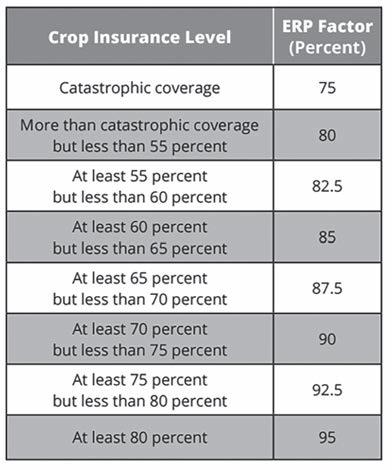
Policies with SCO and ECO can also qualify for the ERP disaster payment, but it may not be a very common thing as it caps payment at 95 percent payment level and the ECO coverage level is already high. That will be set up through and ERP “Phase 1b” sign up that should be going out in early July. I think this is delayed due to late payment release on these programs compared to your base Multi-Peril Crop Insurance policy. So, if you did sign up for SCO or ECO it will be a little later but is worth looking into as you may at least get your insurance premium on those products back.
Below are some helpful links and information for you.
Here are the most recent items and new updates to the USDA Emergency Relief web pages from RMA: https:// www.fsa.usda.gov/programs-andservices/emergency-relief/index#erp.
https://www.fsa.usda.gov/ Assets/USDA-FSA-Public/usdafiles/ FactSheets/2022/fsa_erp_ factsheet_2022_051222_final_v2.pdf
RMA also has their updated FAQs here: https://www.rma.usda.gov/ en/News-Room/Frequently-AskedQuestions/Emergency-Relief-Programfor-Crop-Losses-in-2020-and-2021
Also helpful is the Farmers.gov guide to 6 Emergency Relief Program Checklist Items for Eligible Farmers web page, that I am told is being updated daily. https://www.farmers.gov/blog/ top-6-emergency-relief-programchecklist-items-eligible-farmers
Here is part of a small article with a few of the instructions for your farmers from the Farmers.gov website.
FSA started mailing 303,000 pre-filled applications this week for the Emergency Relief Program (ERP) and farmers and ranchers are encouraged to be on the lookout for them in their mailboxes. This new program, as part of the Extending Government Funding and
Delivering Emergency Assistance Act, aims to help producers impacted by natural disasters such as wildfires, droughts, hurricanes, winter storms and more during 2020 and 2021. The program is expected to distribute $6 billion in assistance on a fast timeline.
* Check required forms on file with FSA. There are five forms you may need to have submitted. *If you have previously participated in FSA programs, you will likely have these required forms on file. Contact your local FSA county office if you are uncertain.
* Check historically underserved status (including beginning, limited resource, socially disadvantaged and veteran farmers and ranchers) with FSA, if applicable. Producers with this designation will receive a 15 percent higher ERP payment.

* Check your future insurance coverage. If you receive ERP phase one funding, you are statutorily required to purchase crop insurance, or NAP coverage where crop insurance is not available, for the next two available crop years, as determined by the secretary.
* Check your bank. Once the ERP application has been submitted and signed by FSA, those with direct deposit should receive payment within three business days.
There are still a lot of questions out there on this new program as it is new, but the USDA has been very good about keeping us all updated as it goes.
ERP forms are due on July 22. ■
By Dennie Stratton, FUI Sales Director Crop Insurance Distribution
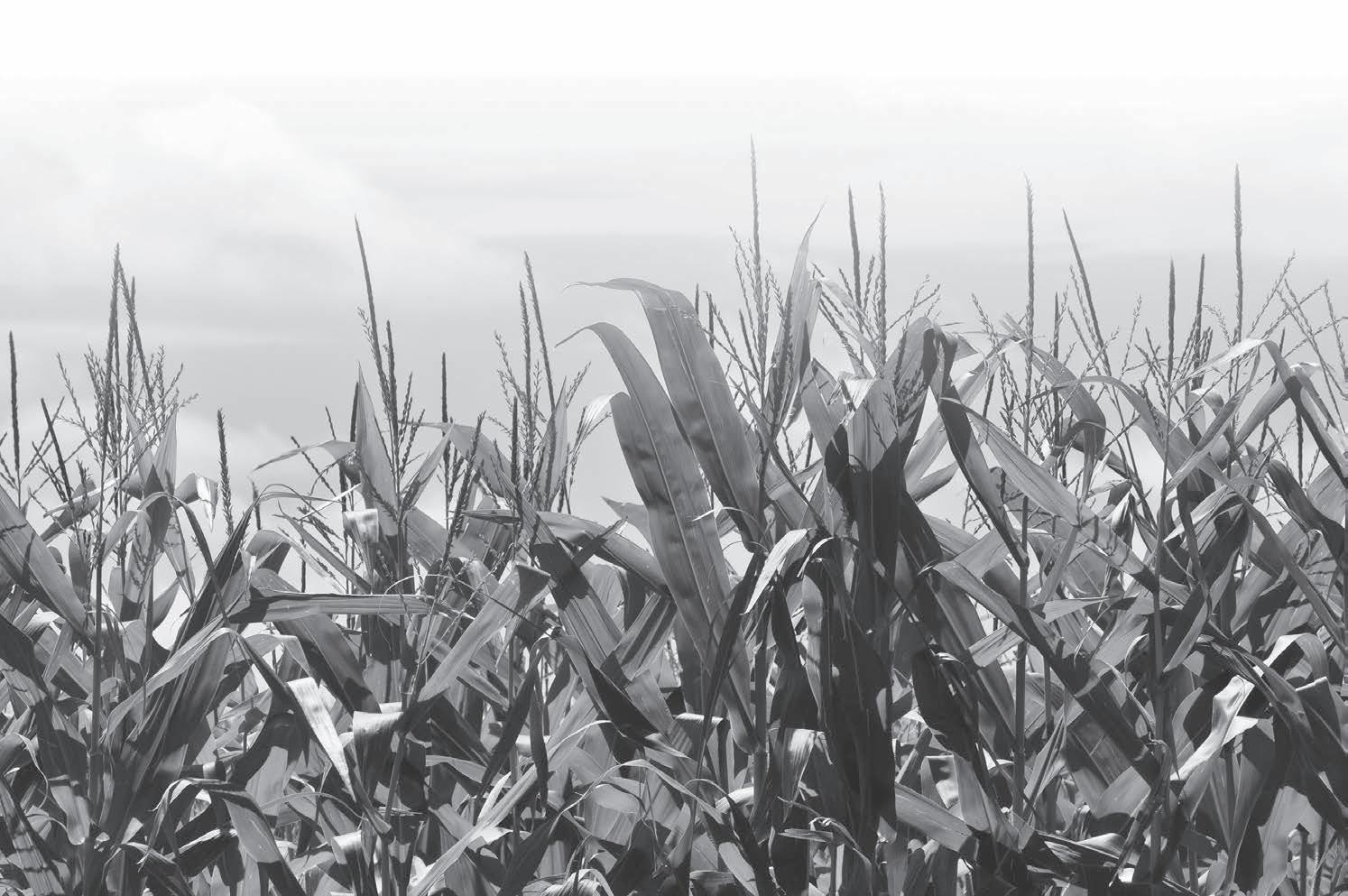
Union Farmer
14 July 2022 www.sdfu.org
Thank You
Thanks for the opportunity to receive this scholarship! I am so grateful for this organization and everything it has done for me over the years!
Thanks, Casey Tolsma Recipient of a $500 Foundation Scholarship
***
Thank you for coming in to give a presentation for our farm safety program. Our FFA chapter is grateful to you and we hope together we have helped our youth be a little safer.
Sincerely, Simon Bowar Faulkton FFA Chapter
Departings
James N. Comes of Waverly, S.D., passed away on May 23, 2022. He is survived by his wife, Joyce Comes; his children, Darrin Comes, Laurie Hulscher (Larry), Brian Comes (Lisa) and Chad Comes (Heidi).
Farmers Union signs available
Show your Farmers Union spirit with a special Farmers Union sign. Available for a limited time, the sign makes a fun addition to the farm driveway, the side of a barn or even a statement piece in the house.
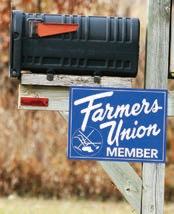
The cost per sign is $10 or free with a five-year or greater membership to Farmers Union. To get yours today, contact Membership Specialist Kelli Peterson at 605-352-6761 ext 116 or at kpeterson@sdfu.org.
4 Ways to Connect With Us! SOUTH DAKOTA FARMERS UNION
mail to: sdfu@sdfu.org

Like us for updates, photos, news, and so much more. https://www.facebook.com/ South-Dakota-Farmers-Union277721538812/

Follow us for the latest legislative updates and news. https://twitter.com/sdfarmersunion

View videos at the South Dakota Farmers Union Channel. https://www.youtube.com/ user/sdfarmersunion

Union Farmer
SDFU CLIP AND SAVE CALENDAR
(SUBJECT TO CHANGE)
June 2022
30 Day County Camp, Webster
30 Safety Trailer – Day County Camp, Webster
30 Haakon/Jackson County Camp, Philip
July 2022
4 Office Closed – 4th of July
5-7 District 3 & 7 Camp, Lake Byron
6 District 4 Meeting, Winner
11 Jerauld/Buffalo County Camp, Wessington Springs
11 Spink County Camp, Frankfort
12-13 SDFU Board Meetings
13 Minnehaha County Camp, Hartford
14 Marshall County Camp, Britton
14 Policy Committee Meeting, Huron
18 Hanson County Camp, Alexandria
ORDER YOUR OWN COPY OF THE FARMERS UNION CENTENNIAL COOKBOOK

Cookbooks are $10 plus tax and shipping. Contact Kelli Peterson 605-352-6761, ext 116, to place your order today!
Super Mashed Potatoes
Add pepper, butter, sour cream, cream cheese and salt to the mashed potatoes. Beat together until light and fluffy. Put into a greased casserole dish. Dot with additional butter, cover and refrigerate. When ready to use, bake uncovered in 350 degrees F oven for 30 minutes or until heated through. Note: may also be frozen or stored until needed in the refrigerator. Serves 6 to 8.
19 McCook County Camp, Salem
21 Davison County Camp, Aberdeen
29 Summer Spotlight Ice Cream Social, Huron
August 2022
1 District 3 Meeting, Pizza Ranch, Watertown
2 District 1 Meeting via Zoom
6 Safety Trailer – Yankton County Fair
12 Safety Trailer – Clay County Fair
20 Safety Trailer – Brown County Fair
September 2022
3 Farmers Union Day at S.D. State Fair, Huron
5 Office Closed – Labor Day
October 2022
6 Western Jr. Herd Builder Give-aWay
10 Office closed – Columbus Day
November 2022
24-25 Office closed – Thanksgiving December 2022
1-2 CHS Annual Meeting, Minneapolis, Minn.
15-16 State Convention, Huron 23-26 Office closed – Christmas
Eleanor Steptoe, S.D.
COOK’S CORNER
www.sdfu.org July 2022 15
5 lb. potatoes, cooked, drained, mashed ½ tsp. pepper ½ c. butter 1 c. sour cream 8 oz. cream cheese 1 tsp. salt
HURON Blaine Anderson 352-2130
IRENE Brendon Hansen 263-2121
IRENE Brian Hansen 263-3342
KADOKA Donna Enders 837-2144
LEMMON Chris Goldsmith 374-3462
MARION Kevin Albrecht 941-0650

MENNO Brendon Hansen 387-5555
MITCHELL David Schelske 660-2743
MITCHELL Zach Horstman 840-0440
MITCHELL Blake Guymon 996-7132
PIEDMONT Ce Faulkner 737-0463
PIERRE Andrew Mefferd 224-4123
PLATTE Craig Guymon 996-7132
RAPID CITY Kasey Keller 343-4213
RAPID CITY Dan Lewis 342-3585
RAPID CITY Jake Lewis 342-3585
SIOUX
SIOUX FALLS Jeff Nord 338-5302
SIOUX
SIOUX FALLS Stacy Mongar 338-5302
SISSETON
SISSETON Erica Steiner 698-7316
SPEARFISH
SPEARFISH Scott Sabers 642-8870
STURGIS
STURGIS Scott Sabers 347-4507
WATERTOWN
WATERTOWN Todd Nichols 886-9683
WEBSTER Debbie Baumgarn 345-2640
WEBSTER
WEBSTER Larry Baumgarn. 345-2640
WEBSTER
WINNER
WINNER Jeremy Clay 842-1556
YANKTON
YANKTON James Murphy 664-2121
Protecting What’s Important in Life Simply Different | fumic.com ABERDEEN J.R. Johnson ............725-3003 ABERDEEN Cameron Lux ............229-3945 BISON Alan Voller ................244-7431 BISON Karen Voller ..............244-7431 BRITTON Tom Farber ...............448-5150 BROOKINGS Gary Ray ..................692-6735 BROOKINGS Beth Reams .............690-3018 BROOKINGS Heidi Fields ..............881-2830 BUFFALO Jenn Wickstrom ........375-3311 CLARK Lon Reidburn ...........532-3299 DOLAND Mark Rozell ..............635-6511 FAULKTON Dawn Melius.............598-6570 GROTON J.R. Johnson ............397-8155 HURON Blaine Anderson .......352-2130 IRENE Brendon Hansen ......263-2121 IRENE Brian Hansen ...........263-3342 KADOKA Donna Enders...........837-2144 LEMMON Carrie Derschan........374-3462 LEMMON Chris Goldsmith ........374-3462 MARION Kevin Albrecht ..........941-0650 MENNO Brendon Hansen ......387-5555 MITCHELL Ryan Leischner .........996-9651 PIEDMONT Ce Faulkner ..............737-0463 PIERRE Andrew Mefferd ........224-4123 RAPID CITY Kasey Keller..............343-4213 RAPID CITY Dan Lewis.................342-3585
FALLS Jeff Nord ..................338-5302
FALLS Stacy Mongar ...........338-5302
Erica Steiner .............698-7316
Scott Sabers .............642-8870
Scott Sabers .............347-4507
Todd Nichols ............886-9683
Debbie Baumgarn ....345-2640
Larry Baumgarn........345-2640
Jeremy Clay ..............842-1556
James Murphy..........664-2121 AUTO | HOME | FARM | CROP | LIFE | ANNUITY | COMMERCIAL | HEALTH ABERDEEN J.R. Johnson 725-3003 ABERDEEN Cameron Lux 229-3945 BISON Alan Voller 244-7431 BISON Karen Voller 244-7431 BRITTON Tom Farber 448-5150 BROOKINGS Gary Ray 692-6735 BROOKINGS Beth Reams 690-3018 BROOKINGS Heidi Fields 881-2830 BUFFALO Jenn Wickstrom 375-3311 CLARK Lon Reidburn 532-3299 DOLAND Mark Rozell 635-6511 FAULKTON Dawn Melius 598-6570 GROTON J.R. Johnson 397-8155
